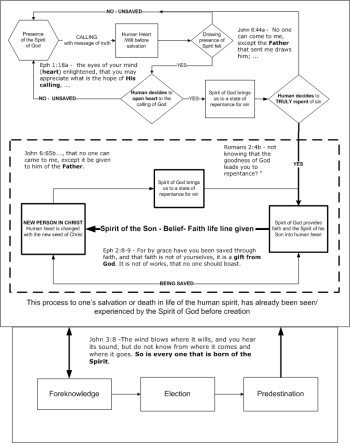I didn't say a person was motivated by divine origin. :) Right? I said his motives had a divine origin. His motives are his. They belong to him. But he received them from God.A man choosing to commit a series of murder is motivated by divine origin?
To better comprehend this topic, as I previously stated, we can compare our existence to a novel. In the same way that a novelist creates a story, God is the creator of our lives. For example, if a novelist writes a story about a man who, consumed by hate, decides to kill his wife, the man is guilty of murder. His actions can be explained in the context of the story the novelist is telling. But just as we don't hold the novelist accountable for the murder, we don't hold God accountable for the evil actions of his creatures.
Can you convince yourself that an ellipse is a circle when looking at the eclipse from a particular vantage point? Imagine you have a cylinder. Turn the cylinder so that you are looking down the long axis and you will see a circle. Cut the cylinder in half at an angle. The cut will look like an ellipse from the side but it will continue to look like a circle from the top.<Sigh>I cannot convince myself that circles are not round.
The concepts of freedom and God's sovereignty are like a cylinder in our hand, which can be turned to reveal a rectangle or a circle. However, we cannot see the ellipse until we find a new perspective. To understand the nature of God in relation to his creatures, we need to gain a new perspective. We can do this by understanding God's transcendent nature.
The analogy between an author and a novel helps me understand the principle of transcendence. It is because an author is to God what a novel is to reality. An author transcends his novel in such a way that causality is subject to his will. Nothing happens in the novel unless the author writes it. Moreover, no characters exist in the novel other than the ones the author writes about. However, since the author is a rational being, causality within the novel uses the same logic as causality within his reality.
Accordingly, if God "writes" that a man murders his wife, then the man's rational and motives are understood within the reality/novel that God is writing.
Not sure why.To suggest it is a matter of will, a matter of stubborness or moral defect on my part is absurd!
I'm not sure how.You keep getting things backwards, confusing cause and effect.
I agree. However, what I began to understand from the prophets is that God is also causing the Red Sea to flow "normally." From a particular perspective, the Red Sea flows according the "laws of physics" but from another perspective, the "laws of physics" is nothing more and nothing less than "what God normally does."Consider how well Christians keep the command to love one another so the world will know we are Christ's disciples? Horrible. Anyone paying attention has NO REASON TO BELIEF what we are saying is true. Said differently, the ancients believed because of evidence! The Hebrews saw God part the Red Sea and many other signs and wonders.
I agree with your observation concerning evidence and the lack of empiricism in the world today.
I understand your rant and I know how much this subject can result in bitterness and strife, which is why I normally avoid it. I called the thread an "open dialog" so that we might share ideas and perspective and allow for each person to make up his or her own mind.Today, religionists are contend to divorce their theology from reality and actually expect people to believe despite their experience. Rather than look inward at our failure - to love each other as Christ loved us - we are content to condemn the image bearer of God for "willful unbelief."
To conclude this rant, I fundamentally reject these posts of your @CadyandZoe in the strongest possible terms! I suppose this is the basis for so much acrimony against Calvinism.
I appreciate the "push-back" especially because I know you to be fair and reasonable and willing to dialog. And I respect your opinion and value your feedback. Thanks



